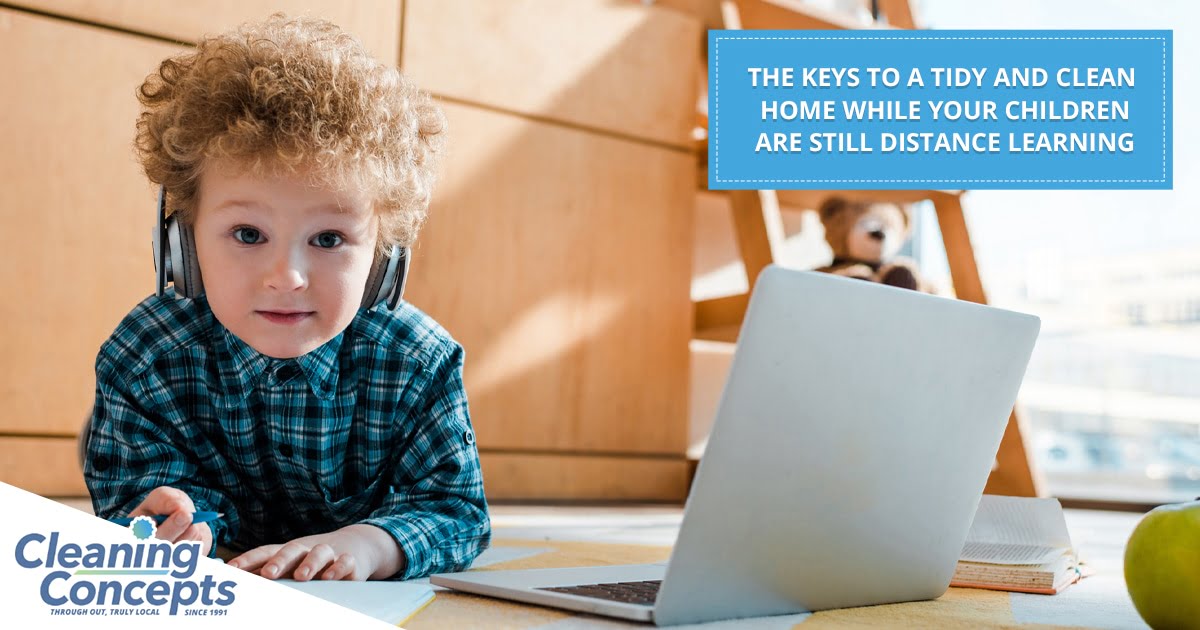
Total chaos is what best describes how most homes look like when the kids are around. From toys strewn all over, food stains and spills on the floor, and barely a clean patch on site, anyone would be forgiven for assuming a bomb went off inside your home.
Kids are a delight; they bring so much life in what would otherwise be a dull blank space. But, when you have to think about how much work it takes to clean up after them, they don’t seem that adorable anymore. It’s even harder now to keep your home looking spic and span when homeschooling or remote-learning might now be the norm. You are forced to watch after your kids and, at the same time, monitor them while they study.
Are you at the last of your wits unable to keep your home organized? Here are some practical tips on how to keep a house clean all the time with your kids’ at home and ready for studying and homework.
- Ask the Kids to Clean up After Themselves
Children as young as three years old can learn how to clean up after themselves by picking up items and plastic toys they use during learning. Older kids can handle difficult chores like mopping the floors and organizing the bookshelves, among other duties.
Chip in and give them a hand if you see your kids struggling. Sing fun songs or put on some lively kid-friendly music to get everyone motivated and in an excellent mood to brush the carpets, wipe the tables, and dust the seats, and so on.
Be patient with your kids as they get the hang of cleaning their own mess. They may not be as focused or as fast as you are, but with your gentle nudges and constant reminders, the study area and the rest of the house will remain clean soon.
- Make Cleaning Part of Learning
The same way you would allocate forty minutes for math studies, how about you set some time every day to teach your kids how to organize, wash, and clean their study area?
Teaching your kids how to keep their spaces clean helps them cultivate a sense of independence. They don’t always have to wait for mom to vacuum the floors, clear the table, or put away their books, paintbrushes, pens, pencils, and other items used in school work.
By learning how to clean, children as young as four years old learn responsibility. They feel good about doing something productive and getting props from mom for doing a good job. Making cleaning regular allows the kids to make it routine unconsciously.
- Design a Daily Chore Chart
How does each kid know what their specific duty is at any given time? This is where a daily chore chart comes in. Assuming you have two or more kids in your home, a daily chore chart works as a point of reference that tells each kid what they are supposed to do.
The chart includes sections featuring days of the week, a list of chores, and the names of each child as per their chore. If, for example, a child named Kevin refers to the chart, they can see that they are supposed to sort the stationery and organize it in the drawers on Monday. On the same day, another child named Sally may be given the duty to clear the table and push the chairs in place, it goes on and on up to the last kid.
Remember to be age-appropriate as you allocate tasks where younger kids get to do the easy stuff, and older kids handle the slightly harder chores. Also, balance out the chores so that one kid doesn’t always end up doing the same chore every day.
- Set Up a Reward System
Most parents frown upon the idea of rewarding their kids for cleaning up after themselves. However, an effective reward system doesn’t have to be so drastic. Set up a reward system that is motivational and healthy for a child’s mental development. For example, make it clear that if the kids finish their homework and do their chores on time, they can watch TV for an hour during their break.
Other excellent reward systems include offering them cookies, letting them ride their bikes or play outside with friends, weekend sleepovers (for when it’s possible) and so on.
Helping your kid learn how to stay clean and organized has been found to improve their confidence even outside of school. They can better interact socially with other kids and adults, and they can negotiate to quickly get themselves out of tricky/puzzling situations and generally become smarter.
Do you find it near impossible to keep your children’s learning areas clutter-free? You are not alone. Any parent who now has to help their kids with their classes online sings the same song. Stick to your routines, and soon cleaning will become second nature even for your kids. They will automatically know what to do and where everything goes after they are done with their school work. But with the tips above, clean study space isn’t that hard to maintain. And if you ever need any extra help, just call us, the professional cleaners, and we’ll help you take a big load off your daily life.
